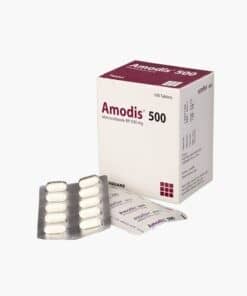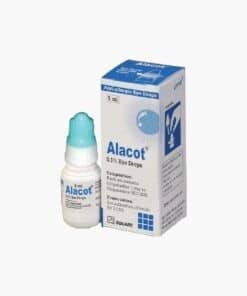Relaxo | 25 mg | Capsule | 10 pcs
৳ 100.00
Brand Name: Relaxo Capsule
Generic: Dantrolene Sodium
25 mg
Manufacturer: Ziska Pharmaceuticals Ltd.
Unit Price: ৳ 10.00 (5 x 10: ৳ 500.00)
Strip Price: ৳ 100.00
Indications
In Chronic Spasticity: Dantrolene is indicated in controlling the manifestations of clinical spasticity resulting from upper motor neuron disorders (e.g., spinal cord injury, stroke, cerebral palsy or multiple sclerosis). It is of particular benefit to the patient whose functional rehabilitation has been retarded by the sequelae of spasticity. Dantrolene is not indicated in the treatment of skeletal muscle spasm resulting from rheumatic disorders.
A decision to continue the administration of Dantrolene on a long-term basis is justified if introduction of the drug into the patient’s regimen:
- Produces a significant reduction in painful and/or disabling spasticity such as clonus, or
- Permits a significant reduction in the intensity and/or degree of nursing care required, or
- Rids the patient of any annoying manifestation of spasticity considered important by the patient himself.
In Malignant Hyperthermia: Oral Dantrolene is also indicated preoperatively to prevent or attenuate the development of signs of malignant hyperthermia in known, or strongly suspect, malignant hyperthermia susceptible patients who require anesthesia and/or surgery.
Therapeutic Class
Pharmacology
Dosage & Administration
For Use in Chronic Spasticity: It is important that the dosage be titrated and individualized for maximum effect. The lowest dose compatible with optimal response is recommended. Each dosage level should be maintained for seven days to determine the patient’s response. If no further benefit is observed at the next higher dose, dosage should be decreased to the previous lower dose.
Adults: 25 mg once daily for seven days, then 25 mg t.i.d. for seven days, 50 mg t.i.d. for seven days, 100 mg t.i.d.
Pediatric Patients: 0.5 mg/kg once daily for seven days, then 0.5 mg/kg t.i.d. for seven days, 1 mg/kg t.i.d. for seven days, 2 mg/kg t.i.d. Therapy with a dose four times daily may be necessary for some individuals. Doses higher than 100 mg four times daily should not be used.
For Malignant Hyperthermia:
- Preoperatively: 4 to 8 mg/kg/day of oral Dantrolene in 3 or 4 divided doses for one or two days prior to surgery, with the last dose being given approximately 3 to 4 hours before scheduled surgery with a minimum of water.
- Post Crisis Follow-up: Oral Dantrolene should also be administered following a malignant hyperthermia crisis, in doses of 4 to 8 mg/kg per day in four divided doses, for a one to three day period to prevent recurrence of the manifestations of malignant hyperthermia.
Interaction
Contraindications
Side Effects
Pregnancy & Lactation
Precautions & Warnings
Fataland non-fatal liver disorders of an idiosyncratic or hypersensitivity type may occur with Dantrolene therapy. At the start of Dantrolene therapy, it is desirable to do liver function studies (SGOT, SGPT, alkaline phosphatase, total bilirubin) for a baseline or to establish whether there is pre-existing liver disease. If baseline liver abnormalities exist and are confirmed, there is a clear possibility that the potential for Dantrolene hepatotoxicity could be enhanced, although such a possibility has not yet been established. Liver function studies (e.g., SGOT or SGPT) should be performed at appropriate intervals during Dantrolene therapy. If such studies reveal abnormal values, therapy should generally be discontinued. If symptoms compatible with hepatitis, accompanied by abnormalities in liver function tests or jaundice appear, Dantrolene should be discontinued. Dantrolene should be used with particular caution in females and in patients over 35 years of age in view of apparent greater likelihood of drug-induced, potentially fatal, hepatocellular disease in these groups.
Dantrolene should be used with caution in patients with impaired pulmonary function, particularly those with obstructive pulmonary disease and in patients with severely impaired cardiac function due to myocardial disease. Dantrolene is associated with pleural effusion with associated eosinophilia. Patients should be cautioned against driving a motor vehicle or participating in hazardous occupations while taking Dantrolene. Caution should be exercised in the concomitant administration of tranquilizing agents. Dantrolene might possibly evoke a photosensitivity reaction; patients should be cautioned about exposure to sunlight while taking it.
Use in Special Populations
Storage Conditions
| Generic Name | Dantrolene Sodium |
|---|---|
| Size | 25 mg |
Only logged in customers who have purchased this product may leave a review.











Reviews
There are no reviews yet.